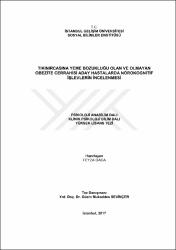| dc.contributor.author | Baca, Feyza | |
| dc.date.accessioned | 2019-01-14T12:09:42Z | |
| dc.date.available | 2019-01-14T12:09:42Z | |
| dc.date.issued | 2017-06-12 | |
| dc.date.submitted | 2017-06-12 | |
| dc.identifier.uri | http://hdl.handle.net/11363/862 | |
| dc.description | Danışman: Güzin Mukaddes Sevinçer. | en_US |
| dc.description.abstract | Obezite günümüzde çok sık karşılaşılan morbidite ve mortalite oranı gittikçe yükselen önemli bir hastalıktır. Beraberinde yol açtığı fiziksel ve psikolojik sağlık problemleri ile de sıkça araştırılan bir hastalık haline gelmiştir. Son zamanlarda yapılan çalışmalar obezitenin nörokognitif süreçleri de olumsuz etkilediğini göstermiştir. Beden kitle indeksi arttıkça dikkat, bellek, inhibitör kontrolü gibi süreçlerin zayıfladığını gösteren pek çok çalışma mevcuttur. Yeme bozuklukları da obeziteyle beraber sıkça görülen hastalıklardandır, tıkınırcasına yeme bozukluğu bunlardan obeziteye en çok eşlik edenidir. Obezitenin kognitif işlevlerde düşüşe yol açtığı yapılan çalışmalarla gösterilmiş olmakla birlikte tıkınırcasına yeme bozukluğunun bu kognitif işlevlere etkisi tartışmalıdır. Bu nedenle çalışmamızda bu konu aydınlatılmaya çalışılmış, obezite cerrahisi aday hastalar klinik gözlemle tıkınırcasına yeme bozukluğu olanlar ve olmayanlar olarak gruplandırılmış ve nörokognitif açıdan karşılaştırılmıştır. Çalışmanın örneklemini Bezmialem Vakıf Üniversitesi Hastanesi obezite cerrahisine başvuran 73 hasta oluşturmuştur. Hastalara nörokoginitif işlevlerini değerlendirmek için Öktem Sözel Bellek Süreçleri Testi, İz Sürme Testi, Stroop Testi uygulanmıştır. Çalışmada elde edilen bulgular değerlendirilirken, istatistiksel analizler için SPSS 22.0 İstatistik paket programı kullanılmıştır. Çalışma verileri değerlendirilirken tanımlayıcı istatistiksel metotların (Frekans, Yüzde, Ortalama, Standart sapma) yanı sıra normal dağılımın incelenmesi için Kolmogorov - Smirnov dağılım testi kullanılmıştır. Kategorik verilerin karşılaştırılmasında ise Pearson Ki-Kare testi ve Fisher Exact test kullanılmıştır. Parametrelerin gruplar arası karşılaştırmalarında t testi kullanılmıştır. Sonuçlar % 95 güven aralığında, p<0,05 anlamlılık düzeyinde değerlendirilmiştir. Tıkınırcasına yeme bozukluğu olan ve olmayan obezite cerrahisi aday hastaların beden kitle indeksi, cinsel taciz öyküsü, depresyon ve intihar düşünceleri, iz sürme testi A formu, Stroop spontan hata puanları, anlık bellek puanları, toplam öğrenme puanları ve öğrenme yanlışı puanları bakımından farklılaştığı bulunmuştur. Bulgulara göre tıkınırcasına yemesi olan hastalar olmayanlara göre kısa süreli bellek, öğrenme, dikkat, inhibisyon becerileri bakımından daha düşük performans göstermişlerdir. | en_US |
| dc.description.abstract | Obesity is an important disease with increasing morbidity and mortality rate which is very common today. It has become a disease that is frequently searched for with the physical and psychological health problems it has caused. Recent studies have shown that obesity also negatively affects neurocognitive processes. There are many studies showing that as the body mass index increases, processes such as attention, memory, inhibitor control become weaker. Eating disorders are also common diseases with obesity, and binge eating disorder is the most common accompanying obesity. The effects of obesity on these cognitive functions should be debated, as shown by studies that have led to a decrease in cognitive functions. Therefore, in this study, we tried to elucidate this issue, candidate obesity surgeons were grouped as clinically obsessive eating disorder patients and non-obese eating disorder patients and compared in terms of neurocognition. The sample of the study consisted of 73 patients who applied to the Bezmialem Foundation University Hospital for obesity surgeons. Öktem Verbal Memory Processes Test, Trail Making Test, Stroop Test were applied to evaluate neurocognitive functions of the patients. While the findings obtained in the study were evaluated, SPSS 22.0 statistical package program was used for statistical analysis. The Kolmogorov - Smirnov distribution test was used to examine the descriptive statistical methods (Frequency, Percentage, Mean, Standard deviation) as well as the normal distribution when evaluating the study data. Pearson Chi-square test and Fisher Exact test were used for comparison of categorical data. The t test was used for the comparison of parameters between groups. The results were evaluated at 95% confidence interval, p <0.05 significance level. Obesity surgeons with and without binge eating disorders were found to differ in terms of body mass index, sexual abuse story, depression and suicidal ideation, trauma test form, Stroop spontaneous error scores, instant memory scores, total learning scores and learning error scores. According to findings, short-term memory has less performance in terms of learning, attention, inhibition skills compared to those without binge eating. | en_US |
| dc.language.iso | tur | en_US |
| dc.publisher | İstanbul Gelişim Üniversitesi Sosyal Bilimler Enstitüsü | en_US |
| dc.rights | info:eu-repo/semantics/openAccess | en_US |
| dc.rights | Attribution-NonCommercial-NoDerivs 3.0 United States | * |
| dc.rights.uri | http://creativecommons.org/licenses/by-nc-nd/3.0/us/ | * |
| dc.subject | Research Subject Categories::SOCIAL SCIENCES | en_US |
| dc.subject | Psikoloji | en_US |
| dc.subject | Obezite | en_US |
| dc.title | Tıkınırcasına yeme bozukluğu olan ve olmayan obezite cerrahisi aday hastalarda nörokognitif işlevlerin incelenmesi | en_US |
| dc.title.alternative | The assessment of neurocognitive functions in bariatric surgery candidates with and without binge eating disorder | en_US |
| dc.type | masterThesis | en_US |
| dc.department | İstanbul Gelişim Üniversitesi | en_US |
| dc.relation.publicationcategory | Tez | en_US |



















